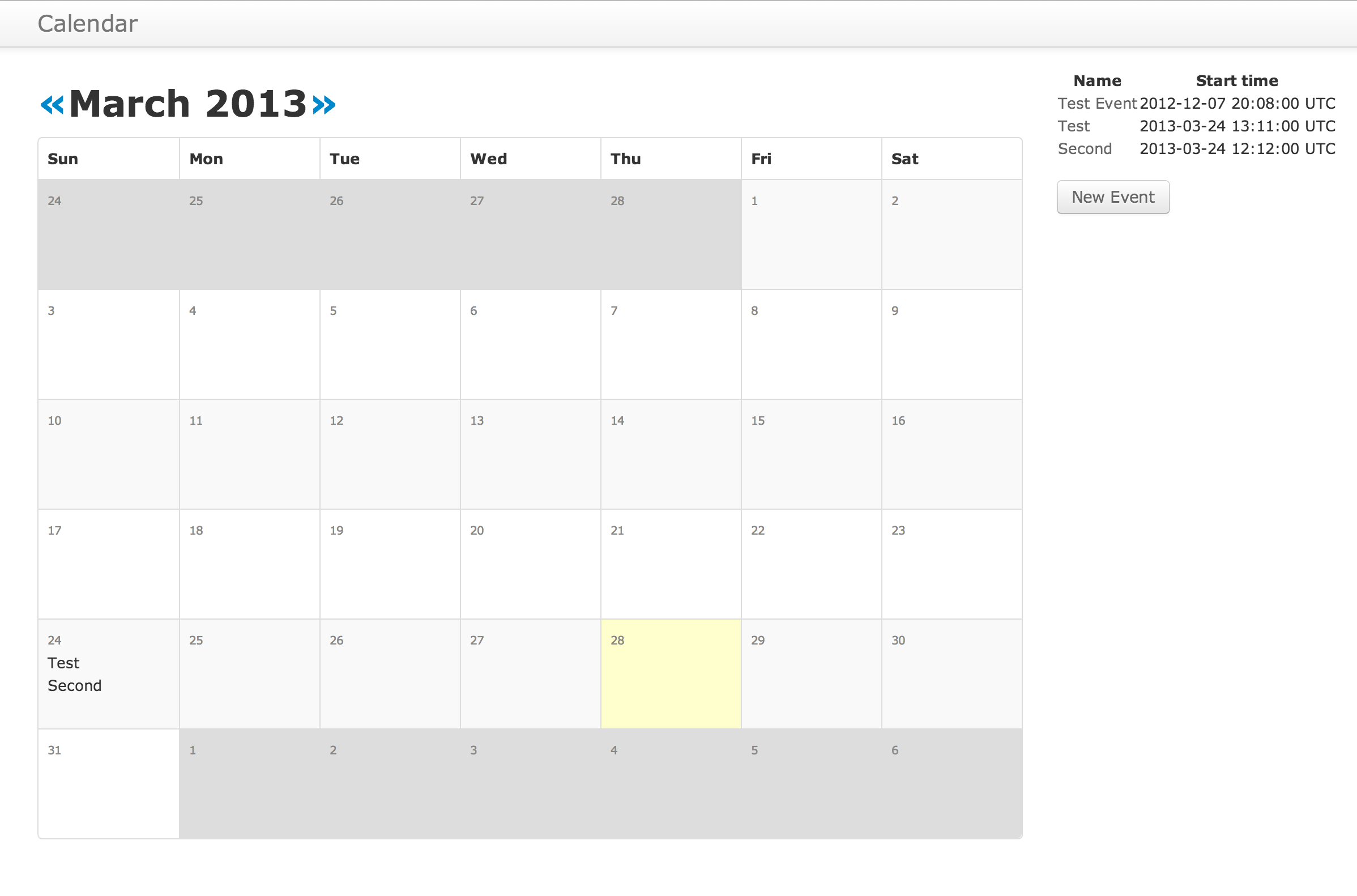README.md in simple_calendar-2.4.1 vs README.md in simple_calendar-2.4.2
- old
+ new
@@ -1,29 +1,30 @@
-
+# Simple Calendar
-Simple Calendar
-===============
+### 📆 A calendar for your Ruby on Rails app.
-Simple Calendar is designed to do one thing really really well: render a
-calendar. It lets you render a calendar of any size. Maybe you want a
+[](https://github.com/excid3/simple_calendar/actions) [](https://badge.fury.io/rb/simple_calendar)
+
+Simple Calendar is designed to do one thing really really well: render a calendar.
+
+It lets you render a calendar of any size. Maybe you want a
day view, a 4 day agenda, a week view, a month view, or a 6 week
calendar. You can do all of that with the new gem, just give it a range
of dates to render.
-It doesn't depend on any ORM so you're free to use it with ActiveRecord,
-Mongoid, any other ORM, or pure Ruby objects.
+It doesn't depend on any ORM so you're free to use it with ActiveRecord, Mongoid, any other ORM, or pure Ruby objects.
Thanks to all contributors for your wonderful help!

Installation
------------
Just add this into your Gemfile followed by a bundle install:
```ruby
-gem "simple_calendar", "~> 2.0"
+gem "simple_calendar", "~> 2.4"
```
If you're using Bootstrap, the calendar should already have a border and
nice spacing for days.
@@ -32,10 +33,17 @@
```scss
*= require simple_calendar
```
+or in your SCSS `app/assets/stylesheets/application.scss` file:
+
+```scss
+@import "simple_calendar";
+```
+
+
Usage
-----
Generating calendars is extremely simple with simple_calendar.
@@ -60,11 +68,11 @@
### Week Calendar
You can generate a week calendar with the `week_calendar` method.
```erb
-<%= week_calendar number_of_weeks: 2 do |date| %>
+<%= week_calendar(number_of_weeks: 2) do |date| %>
<%= date %>
<% end %>
```
Setting `number_of_weeks` is optional and defaults to 1.
@@ -72,11 +80,11 @@
### Custom Length Calendar
You can generate calendars of any length by passing in the number of days you want to render.
```erb
-<%= calendar number_of_days: 4 do |date| %>
+<%= calendar(number_of_days: 4) do |date| %>
<%= date %>
<% end %>
```
Setting `number_of_days` is optional and defaults to 4.
@@ -85,25 +93,52 @@
You can pass in `start_date_param` to change the name of the parameter
in the URL for the current calendar view.
```erb
-<%= calendar start_date_param: :my_date do |date| %>
+<%= calendar(start_date_param: :my_date) do |date| %>
<%= date %>
<% end %>
```
### Custom Partial
You can set a different partial name for calendars by passing the partial path.
```erb
-<%= calendar partial: 'products/calendar' do |date| %>
+<%= calendar(partial: 'products/calendar') do |date| %>
<%= date %>
<% end %>
```
+### Internationalization (I18n)
+
+The default views are prepared to do translation lookups for month names and weekdays.
+
+To profit from that, you can take advantage of the [`rails-i18n`](https://github.com/svenfuchs/rails-i18n/) gem which comes with translations for many languages already.
+
+In a Rails 6 app, the configuration could look like the following:
+
+ * Add `gem 'rails-i18n'` to your `Gemfile` and run `bundle`.
+ * Define the available and default locale e.g. in `config/application.rb`:
+```ruby
+# config/application.rb
+config.i18n.available_locales = [:en, :de, :fr]
+config.i18n.default_locale = :en
+```
+ * Define the following translation keys:
+```yaml
+# e.g. config/locales/de.yml
+de:
+ simple_calendar:
+ previous: "<<"
+ next: ">>"
+ week: Woche
+```
+
+See the [Rails I18n Guide](https://guides.rubyonrails.org/i18n.html) for further information.
+
## Rendering Events
What's a calendar without events in it? There are two simple steps for creating
calendars with events.
@@ -118,11 +153,11 @@
# multi-day events
$ rails g scaffold Meeting name start_time:datetime end_time:datetime
```
-By default it uses `start_time` as the attribute name.
+By default it uses `start_time` as the attribute name.
**If you'd like to use another attribute other than start_time, just
pass it in as the `attribute`**
```erb
<%= month_calendar(attribute: :starts_at) do |date| %>
@@ -158,19 +193,21 @@
We'll just load up all the meetings for this example.
```ruby
def index
- @meetings = Meeting.all
+ # Scope your query to the dates being shown:
+ start_date = params.fetch(:start_date, Date.today).to_date
+ @meetings = Meeting.where(starts_at: start_date.beginning_of_month.beginning_of_week..start_date.end_of_month.end_of_week)
end
```
Then in your view, you can pass in the `events` option to render. The
meetings will automatically be filtered out by day for you.
```erb
-<%= month_calendar events: @meetings do |date, meetings| %>
+<%= month_calendar(events: @meetings) do |date, meetings| %>
<%= date %>
<% meetings.each do |meeting| %>
<div>
<%= meeting.name %>
@@ -380,9 +417,13 @@
Chris Oliver <chris@gorails.com>
[https://gorails.com](https://gorails.com)
[@excid3](https://twitter.com/excid3)
+
+## License
+
+Simple Calendar is licensed under the [MIT License](LICENSE.txt).
## Support
Need help